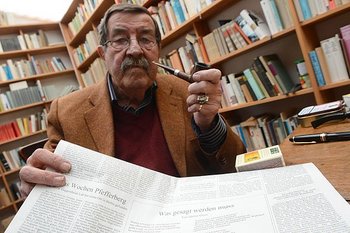 The controversy over Günter Grass’s poem about Israel and Iran only confirms what Grass was saying: That it’s impossible to criticize Israel without being lambasted.
The controversy over Günter Grass’s poem about Israel and Iran only confirms what Grass was saying: That it’s impossible to criticize Israel without being lambasted.
Grass, the Nobel-Prize-winning author of The Tin Drum, among many other works, dared to question Israel’s first strike policy against Iran, dared to underscore “the West’s hypocrisy” that permits Israel to have an arsenal of uninspected nuclear weapons and then permits Israel to threaten to annihilate the Iranian people if Iran tries to get one of its own.
For this, Grass has been roundly condemned. The Israeli government has banned him from entering that country, and Benjamin Netanyahu has ridiculed him for essentially espousing views from Grass’s Nazi youth.
Grass seemed to anticipate just such a reaction and wrestled with whether to speak out or not.
The first words in his poem, after all, are “Why do I stay silent.”
And he answers, in part, because he knows he’ll be hit with the familiar “verdict of ‘anti-Semitism.’ ”
And he knows that Germany’s responsibility for the Holocaust also has kept him silent:
“Because I thought my origin/Afflicted by a stain never to be expunged” served as a muzzle when it came to criticizing Israel, a country “to which I am bound and wish to stay bound.”
As a German, Grass writes that he feels obliged to speak out because Germany is sending Israel another submarine “whose specialty consists of guiding all-destroying warheads.” He writes: “We—as Germans burdened enough—could be suppliers to a crime that is foreseeable.”
He doesn’t make a false equivalence to the Holocaust. In fact, he calls Germany’s “own crimes” as being “without comparison.”
Nor does Grass hold a brief for Iran’s Mahmoud Ahmedinejad— whom he calls a “loud-mouth” subjugating his people.
But Grass worries that an attack by Israel would be catastrophic and that time is getting short.
And so he writes, “aged and with my last ink,” that “the nuclear power Israel endangers/the already fragile world peace.”
He urges Israel to “renounce violence” and he calls on an international agency to take control of both the Israeli and the Iranian nuclear sites.
So what exactly has Gunter Grass done wrong here?
What he wrote about “the West’s hypocrisy” and the nuclear double standard is true.
What he wrote about the impending risk of an Israeli first strike is also true.
And if you believe in nuclear disarmament, as I do, then his position on having the U.N. take over Israel’s and Iran’s nuclear sites is also commendable.
Grass’s words are not the words of an anti-Semite. They are the words of a man of conscience and a man of peace, daring to speak out even as he knows the slurs are coming.
The article above was published on Monday, April 9, 2012 by The Progressive as In Defense of Günter Grass by Matthew Rothschild.
Was gesagt werden muss
|
What Must Be Said
|
